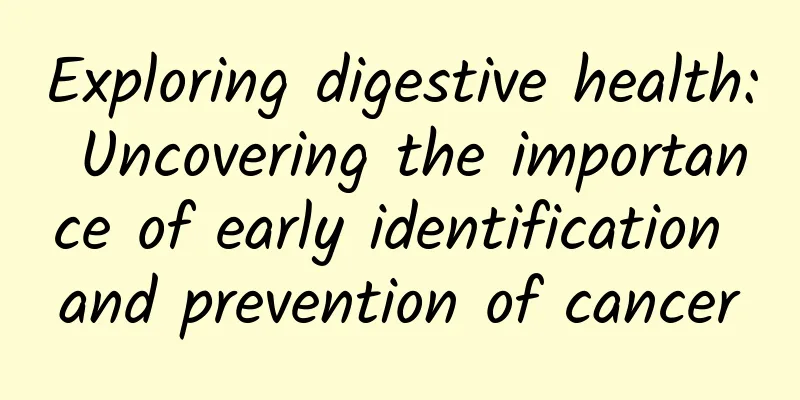Exploring digestive health: Uncovering the importance of early identification and prevention of cancer

|
Author: Tingting, a postdoctoral fellow in clinical medicine at Peking Union Medical College Hospital Reviewer: Shao Yajuan, deputy chief physician, Peking Union Medical College Hospital In our body, there is a magical "food processing line" - the digestive tract, which helps us take in food, absorb nutrients, and excrete waste. However, if an uninvited guest - a digestive tract tumor - appears here, our health will be threatened. The early identification of digestive tract tumors is related to the safety and health of life, however, many people lack sufficient understanding of this. With the change of people's lifestyle, the incidence of digestive tract tumors has increased year by year, and how to detect and identify them early is particularly important. Let us learn about the relevant knowledge of digestive tract tumors to help everyone better understand this disease and its prevention measures. Digestive tract tumors refer to malignant tumors that occur in the digestive system, including esophageal cancer, gastric cancer, colorectal cancer, etc. These cancers usually originate from epithelial cells in the digestive tract, and over time, they gradually invade surrounding tissues and even metastasize to other organs. At present, the exact cause of digestive tract tumors has not yet been fully clarified. Clinicians believe that it is closely related to multiple factors such as genetics, environmental factors, eating habits and lifestyle. First, genetic factors play an important role in digestive tract tumors. People with a family history of digestive tract tumors may be more likely to suffer from digestive tract tumors. Long-term smoking and excessive drinking are considered to be one of the high-risk factors for esophageal cancer and gastric cancer. In addition, dietary habits also have a significant impact on the occurrence of digestive tract tumors, especially high-salt, pickled foods, smoked foods and diets rich in animal fats, which may increase the risk of disease. And the lack of fresh fruits and vegetables in the diet is believed to be associated with the occurrence of colon cancer. The symptoms of digestive tract tumors are often hidden, and there may be no obvious signs in the early stages. Many people often seek medical attention when the disease develops to the middle or late stages because of physical discomfort. Common symptoms include loss of appetite, weight loss, abdominal pain, changes in bowel habits, bloody stools or black stools. When these symptoms appear, they are often manifestations of disease progression. Therefore, regular health checks and early screening are particularly important, especially for high-risk groups. Figure 1 Copyright image, no permission to reprint For healthy people, adopting a healthy lifestyle plays a vital role in the prevention of digestive tract tumors. First of all, it is recommended to consume more fresh vegetables and fruits, increase the intake of fiber, and reduce the intake of red meat and processed meat products. In addition, it is also very important to drink enough water to maintain intestinal health. Try to avoid excessive consumption of high-salt, pickled and fried foods in the diet, and reduce the intake of alcohol and caffeine. Secondly, regular physical exercise helps to enhance the body's immunity and reduce the risk of cancer. It is recommended to perform at least 150 minutes of moderate-intensity exercise per week, such as brisk walking, swimming or cycling, which can effectively help maintain a healthy weight and reduce the risk of cancer caused by obesity. Figure 2 Copyright image, no permission to reprint In addition, regular physical examinations and related screenings are also preventive measures that cannot be ignored. According to my country's national conditions, the "Guidelines for Screening, Early Diagnosis and Early Treatment of Gastric Cancer in China (2022, Beijing)" defines the target population for gastric cancer screening in my country as those aged ≥45 years and meet any of the following conditions: people in areas with high incidence of gastric cancer; Helicobacter pylori infection; first-degree relatives of gastric cancer patients; previous gastric precancerous diseases such as chronic atrophic gastritis, gastric ulcer, gastric polyps, postoperative residual stomach, hypertrophic gastritis, pernicious anemia, etc.; the presence of other high-risk factors for gastric cancer (such as high salt intake, pickled diet, smoking, excessive drinking, etc.). The "Expert Consensus on the Screening Process for Early Colorectal Cancer in China (2019, Shanghai)" recommends that 50 to 75 years old can be used as the target age group for population screening. If there is a family history, screening can be started at the age of 40. Regular gastrointestinal endoscopy can detect potential lesions in a timely manner. Timely screening can greatly increase the chances of early detection and treatment, thereby improving the cure rate. Figure 3 Copyright image, no permission to reprint In short, early detection of digestive tract tumors is extremely important for treatment and prognosis. Each of us should improve our understanding and knowledge of this disease and pay enough attention to it. By developing a healthy lifestyle, maintaining a reasonable diet and undergoing regular health checks, we can effectively reduce the risk of digestive tract tumors and protect our health. |
>>: Hypertension Management Manual, stabilize blood pressure and protect your heart without worries!
Recommend
How long after abortion can I go out?
In today's society, many people will make a d...
Is it too late to do nt at 13 weeks?
As one of the new items of prenatal check-up, NT ...
Small pimples on areola during breastfeeding
Women who are breastfeeding are very concerned ab...
How many days after ovulation does the fertilized egg implant?
For a woman to become pregnant successfully, the ...
It turns out that the stomach is an emotional organ. There is an emotional line from the brain to the stomach.
Science Fiction Network, March 20 (Qin Yingying) ...
What medicine to take to treat accessory breast
In summer, the streets are full of girls wearing ...
Capillary dilation in female legs
Many people are familiar with the disease of capi...
What is Grain in Ear also called? Meteorological proverbs about Grain in Ear
Grain in Ear is one of the 24 solar terms, usuall...
How to relieve gastroenteritis in pregnant women
Gastroenteritis is a very scary thing for web edi...
What are the symptoms of progesterone deficiency?
Progesterone is a common estrogen and is very imp...
Uterine fibroids
Some people choose folk methods to treat uterine ...
Body weakness during mid-pregnancy
Most women will have varying degrees of pregnancy...
Is it normal to have small bumps on the cervix?
The importance of the female uterus is beyond our...
What should I do if I get pregnant and have breast nodules?
As we all know, once a woman becomes pregnant, th...
What are the precautions after taking medicine for abortion?
Currently, many women will take some artificial m...









